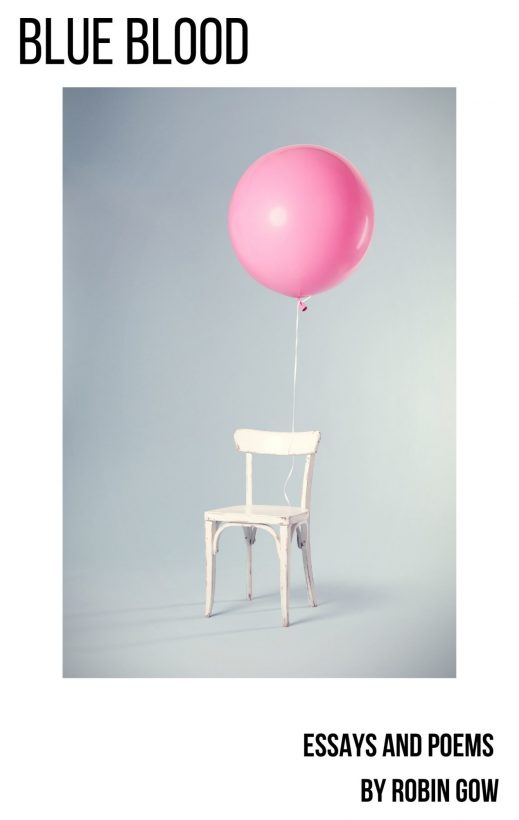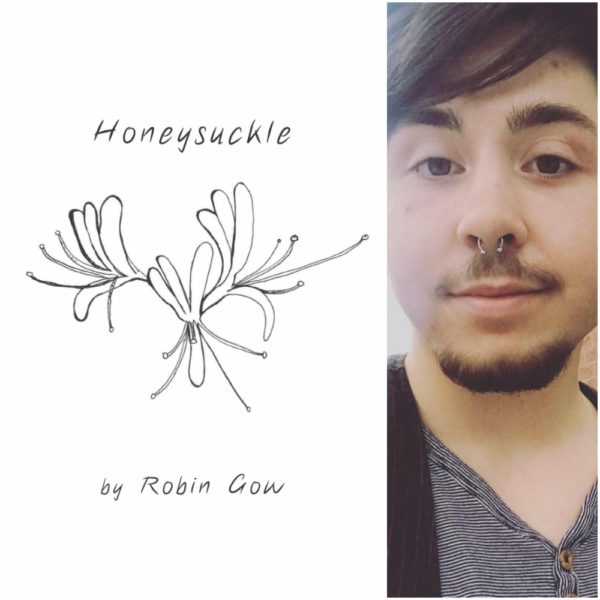
If you would like to read any of Robin’s books but you don’t have funding or access, please reach out. You don’t have to explain your situation, just ask and it’s happy to send a copy though shipping may take a month or so.
YA and Middle Grade
Gooseberry – COMING SOON May 2024

Robin Gow’s Gooseberry is a moving middle-grade novel about a young nonbinary person searching for family and finding it with a sweet rescue dog.
B has lived with so many different foster families and youth programs that they have to invent nicknames for them to keep track. Their parents died in a car accident when they were four, and they’ve been moved around ever since. And even though some foster families don’t really get B or why they haven’t picked a new name yet (though B has been grappling with that for a while), B tries their best to stay positive. They try to keep a list of names that might fit, and they dream of being able to live in a home where they could adopt a dog and teach him all sorts of tricks. So when they meet Gooseberry, they know they have to adopt him and give him a loving home.
But training a dog isn’t as easy as B first suspected. Gooseberry is anxious and barely even wants to let B pet him. But the queer couple B is staying with, Eri and Jodie, help them to adopt Gooseberry and start training him. Even when Gooseberry snaps and growls, B doesn’t give up. But is this new home enough to change things for good for B and Gooseberry?
Moving, heartwarming, and full of hope, Gooseberry is a friendship story classic in the making!
Dear Mothman – March 21, 2023

A moving middle-grade novel in verse, about a young trans boy dealing with the loss of his friend by writing to his favorite cryptid, Mothman
Halfway through sixth grade, Noah’s best friend and the only other trans boy in his school, Lewis, passed away in a car accident. Lewis was adventurous and curious, always bringing a new paranormal story to share with Noah. Together they daydreamed about cryptids and shared discovering their genders and names. After his death, lonely and yearning for someone who could understand him like Lewis once did, Noah starts writing letters to Mothman, wondering if he would understand how Noah feels and also looking for evidence of Mothman’s existence in the vast woods surrounding his small Poconos town. Noah becomes determined to make his science fair project about Mothman, despite his teachers and parents urging him to make a project about something “real.”
Meanwhile, as Noah tries to find Mothman, Noah also starts to make friends with a group of girls in his grade, Hanna, Molly, and Alice, with whom he’d been friendly, but never close to. Now, they welcome him, and he starts to open up to each of them, especially Hanna, who Noah has a crush on. But as strange things start to happen and Noah becomes sure of Mothman’s existence, his parents and teachers don’t believe him. Noah decides it’s up to him to risk everything, trek into the woods, and find Mothman himself.
Ode to My First Car – June 20, 2023
Check out the buzz from SheReads, Book Riot, OverDrive, Reads Rainbow, and LGBTQReads !

It’s a few months before senior year and Claire Kemp, a closeted bisexual, is finally starting to admit she might be falling in love with her best friend, Sophia, who she’s known since they were four.
Trying to pay off the fine from the crash that totals Lars, her beloved car, Claire takes a job at the local nursing home up the street from her house. There she meets Lena, an eighty-eight-year-old lesbian woman who tells her stories about what it was like growing up gay in the 1950s and ’60s.
As Claire spends more time with Lena and grows more confident of her identity, another girl, Pen, comes into the picture, and Claire is caught between two loves–one familiar and well-worn, the other new and untested.
A Million Quiet Revolutions

A modern love story, told in verse, about two teenaged trans boys who name themselves after two Revolutionary War soldiers. A lyrical, aching young adult romance perfect for fans of The Poet X, Darius the Great is Not Okay, and Aristotle and Dante Discover the Universe.
A Million Quiet Revolutions in the Media
Lists
22 Books By Trans And Nonbinary Authors To Get Excited About In 2022 (BuzzFeed)
80 Queer and Feminist Books Coming Out Winter 2022 (AutoStraddle)
Must-Have 2022 Queer Book Releases (NerdDaily)
Reviews
ReadWithPride: A Million Quiet Revolutions by Robin Gow (NerdDaily)
“A sweet and highly earnest transgender love story.” (KIRKUS)
Interviews
Brian Zepka, Robin Gow, and Queer and Trans Representation in YA Literature | Q:LV
Adult Poetry and Essays
Lanternfly August

In Lanternfly August, Robin Gow contends with the emotional geographies of home through the lens of an often-demonized species of insect.
“In Lanternfly August, Robin Gow intertwines the metamorphosis of outlaws to implore, ‘Will I still be beautiful without my hunger?’ The formally inventive poems meditate on unheralded grace despite incremental apocalypse. By declaring, ‘Will someone take a picture of me while I’m still breathing?’ Gow teaches us to survive by embracing ephemerality over futurity.”
– Sarah Sala, author of The Devil’s Lake
“Robin Gow’s Lanternfly August is a marvelous feat. Across this collection, Gow asks us to consider who or what is marked as invasive—like the lanternfly and the tree of heaven, which have the ‘wrong body’ or exist in the ‘wrong context’ and can be killed or cut down without consequence. These poems posit new pathways to identification in the face of such estrangement so that we might imagine anew what flourishing might come after ruin.”
– Donika Kelly, author of bestiary and The Renunciations
“The title ‘Lanternfly August’ describes a point in the lanternfly’s life cycle when it becomes a dramatic bright red, but Robin Gow’s lushly volatile, shimmering book about gender, entomology, bodily experience, and local memory shuffles its chronology backwards and forwards like dealing cards, immersing us in the midst of change. This compelling book explores ways of being inside and outside the body simultaneously (‘My walls were thoraxes,’ ‘Gloves growing around fingers’). It meditates on violence (‘Raise your foot high. Become a boy.’). It witnesses, it confides, experiments with an “I” both singular and plural, weighing metaphors of infestation with belonging.”
– Trace Peterson, author of Since I Moved in
Monstrous Cartography

Through conjuring sea monsters and holding somatic rituals, MONSTROUS CARTOGRAPHY charts and recharts the distances between self, gender, and the words we use to make ourselves legible. These poems speak simultaneously through the bodies of creatures culled from 16th and 17th-century maps and moments of present queer life. Speakers ask, answer, and ask again, how and if we can map our queer complexities.
Backyard Paleontology

This is a taut collection brimming with questions. As poet-paleontologist, Robin Gow gets their hands dirty. These poems dig, unearth, excavate, recover, and reveal. Imbued with the wide-eyed curiosity of childhood, Backyard Paleontology offers a snapshot of a poet in mid-discovery. In one of many clarion moments, the poet writes: “This is how I want to be found.”
— Jan-Henry Gray, author of Documents
[Speculum] Envy
[Speculum] Envy explodes the concept of biological sex and culls the debris, asking what does it mean to be assigned a gender a birth as a body that refuses the binaries of both sex and gender? These speakers grapple with what is written on our bodies and what we will make with that writing. Through recollections of sex work, love, and gynecologist visits the speakers find joy, grief, and celebration often co-occurring and intertwining. When we think of Freudian Theory we usually think of penises but in this chapbook, it’s applied to explore queer/trans relationships to genitalia.
Blue Blood

We All Begin In Water And Are Called Back To The Water. Blue Blood Challenges The Rhetoric That Trans People Are “Unnatural” Through Captivating Verses About Metamorphosis And Meditations On The Concept Of Home. Robin Gow Invites Readers To Resist Imposed Gender Roles And To Celebrate Identity; To Question What Their Own Body Means To Them.
OUR LADY OF PERPETUAL DEGENERACY

What are people saying?
Robin Gow’s first full-length collection is full of verve, sass, mystery, and wonder. In Our Lady of Perpetual Degeneracy, Gow has made a family of queer angels and reclaimed saints in poems that are as finely crafted as they are magical and sincere. “There were no holy orders for women/or queers, so we made Poems, thrived hidden.” Indeed we did and Gow’s book is proof of the thriving. Thank the Holy Queer Mystery for these poems (and for all of our queer and trans lives) – like “hammers in/the flower vases. they bloom.”
– TC Tolbert, author of Gephyromania and co-editor of Troubling the Line: Trans and Genderqueer Poetry and Poetics
Robin Gow’s brilliant poems navigate the liminal world between religious figures and what remains to be figured out, between the real and the sexual and the realignment of expectations. An outspoken curator of sound and meaning, Gow is an accomplished spinner of metaphor, of emphasis, of surprise. Our Lady of Perpetual Degeneracy is the debut full collection from a visionary poet who wields craft with surgical precision, and leaves all of us questioning what we know, and what we recalled we once believed.
-Jaqueline Jones LaMon, author of Last Seen, Gravity USA, and In the Arms of One Who Loves Me
“[T]his is for girls who father each other,” Robin Gow writes a quarter of the way through this mournful, joyful debut. Our Lady of Perpetual Degeneracy is filled with voices that echo into the losses and accumulations of growing up queer and Catholic: stigmatas, microwaved veggie burgers, and hints of more ominous violence. This a book for anyone who grew up a “a girl… but only approximately,” a trans kinship deeply familiar to me and so many people I know—a thing that builds a degeneracy not just perpetual, but graceful and restorative.
-Zefyr Lisowski, author of Blood Box
HONEYSUCKLE

These witty poems. These serious poems. These poems of desire. These poems of transformation. Thank you Robin Gow for these poems in which you translate Ovid for the contemporary curious. I’ve checked my canoe for snakes, I’ve considered a history of Manus Hirschfield “untouched by forward.” Your Swanson frozen dinners and Grindr and colors and flowers and insects all have names and something else as well: revelation and guidance. In this magnificent collection, Honesysuckle is both a proper name and an imperative.
–Judith Baumel, author of The Weight of Numbers, Now, The Kangaroo Girl, Passeggiate.
